|
|
|
|
On Monday, millions of people across the U.S. will have the chance to view a total solar eclipse, a celestial event where the Moon lines up with the Sun and blocks its light. Many people who have had the chance to see one from the path of totality describe the event as otherworldly, with the light taking on a new quality. It’s no wonder that these events have held spiritual significance for both ancient people like the Maya and some modern Christians.
As Penn State astronomer Christopher Palma explains, the science behind solar eclipses is pretty spectacular – and coincidental. The Sun is about 400 times larger than the Moon and it’s also 400 times more distant, which means that the Moon can appear about the same size as the Sun when seen from Earth. Add in factors like the tilt of Earth’s orbit, and it makes sense why these events don’t just happen every month.
If you live along the path of totality, which stretches from Texas, across the Midwest and up toward Maine, or you’re traveling to view the eclipse, make sure to bring a pair of certified eclipse glasses. When you look up at the Sun – even if it’s partly covered by the Moon – you can damage your eyes. These glasses help prevent that damage. But watch out for fakes. Some online marketplaces sell phony eclipse glasses that won’t protect you. Supply chain experts Henry Jin of Miami University and Simone Peinkofer from Michigan State
recommend checking the brand you get with the American Astronomical Society’s list of approved manufacturers.
You might also want to bring your smartphone to take some pictures. Even if phone cameras aren’t great at capturing the Moon or Sun, photography professor Douglas Goodwin writes that changing a few simple settings can take the photos you snap of your surroundings during the eclipse to the next level. Just remember to take a few moments to put your camera down and take in the event.
|

|
Mary Magnuson
Assistant Science Editor
|
|
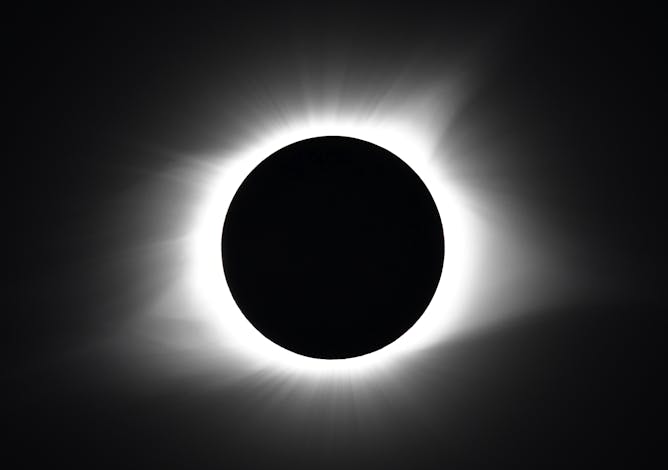
Solar eclipses happen because of a few factors, including the Moon’s size and distance from the Sun.
AP Photo/Timothy D. Easley
Christopher Palma, Penn State
Many people will see a dazzling eclipse this April, but these events are possible only because of the sizes and precise distances between Earth, the Moon and the Sun.
|
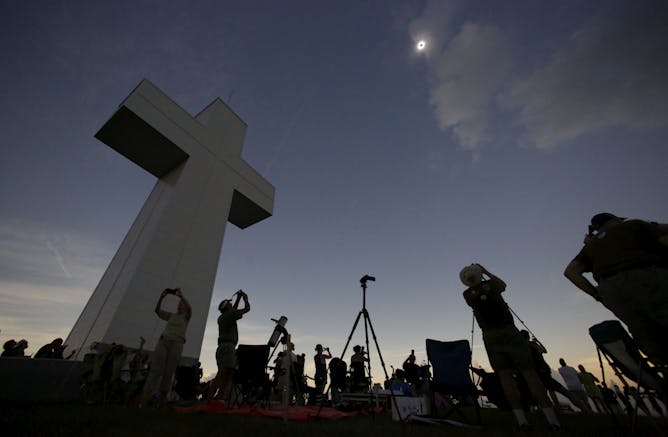
A total solar eclipse is seen above the Bald Knob Cross of Peace on Aug. 21, 2017, in Alto Pass, Illinois.
AP Photo/Charles Rex Arbogast
Eric Vanden Eykel, Ferrum College
A scholar of early Christian literature writes that religious theories around celestial events are part of a larger human pattern to find meaning. And they go back thousands of years.
|
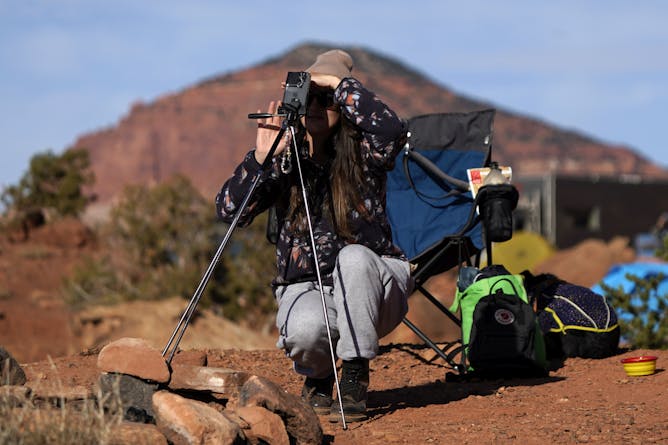
You don’t need a nice professional camera to snap photos of this year’s eclipse.
George Frey via Getty Images News
Douglas Goodwin, Scripps College
Your phone can’t take a perfectly clear picture of a solar eclipse like a professional camera can, but there are lots of other creative directions you can take to capture the rare moment.
|
|
|
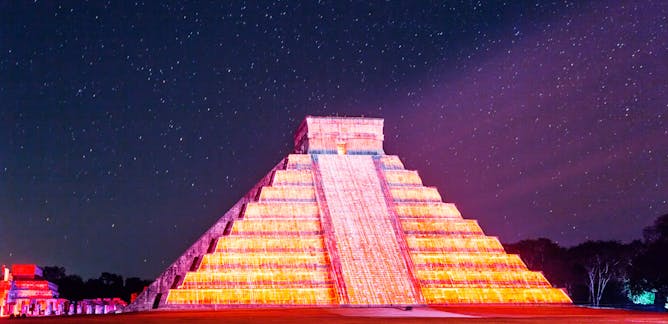
Kimberly H. Breuer, University of Texas at Arlington
The skies and the gods were inseparable in Maya culture. Astronomers kept careful track of events like eclipses in order to perform the renewal ceremonies to continue the world’s cycles of rebirth.
| |
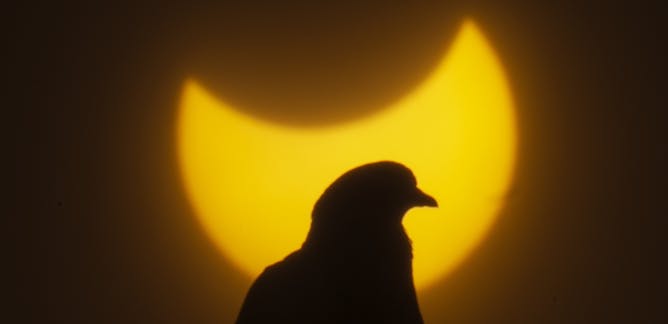
Kimberly Rosvall, Indiana University; Liz Aguilar, Indiana University
Since an eclipse only lasts a few minutes, you need more than just a handful of scientists running around collecting data on bird activity. That’s where a new app comes in.
|
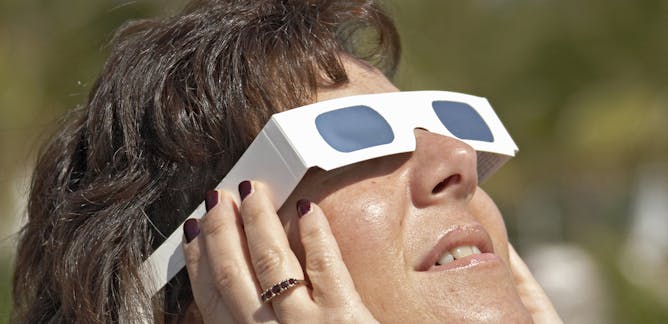
Yao "Henry" Jin, Miami University; Simone Peinkofer, Michigan State University
Don’t skimp on your eye safety.
| |
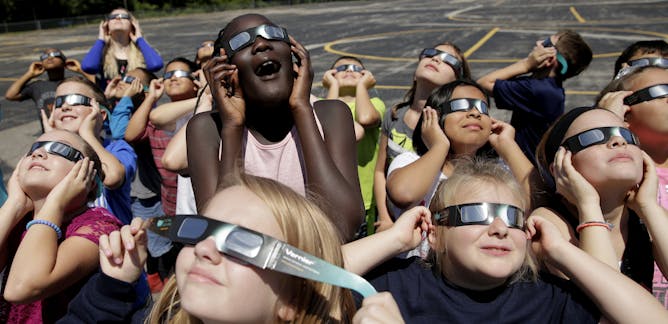
Geoffrey Bradford, West Virginia University
Now’s the time to get your hands on a pair of eclipse glasses in preparation for April’s display of celestial wonder.
|
|
|
|
|
-
David J. Purpura, Purdue University; Lauren Westerberg, Purdue University; Sona Kumar, Purdue University
If you have young kids, the solar eclipse on April 8, 2024, represents a rare opportunity to teach them about science.
-
Gonzalo Rubio, Penn State
More than 2,000 years ago, the Babylonians understood the cycle of eclipses. They also regarded them as signs that could foretell the death of a king.
-
Vahe Peroomian, USC Dornsife College of Letters, Arts and Sciences
When the Moon blocks the Sun during an eclipse, utility suppliers have to pull power from the grid to make up for gaps in solar energy.
-
Cassandra Runyon, College of Charleston; David Hurd, Pennsylvania Western University
Eclipses are rare, fantastic celestial events. Here’s how educators can help visually impaired students enjoy eclipses alongside their sighted peers.
-
Shannon Schmoll, Michigan State University
An astronomer explains how. why and when eclipses happen, what scientists can learn from them, and what they would look like if you were standing on the Moon.
|
|
|
|---|
-
More of The ConversationLike this newsletter? You might be interested in our weekly and biweekly emails: Follow us on social media: -
About The ConversationWe're a nonprofit news organization dedicated to helping academic experts share ideas with the public. We can give away our articles thanks to the help of foundations, universities and readers like you. |
|
| |
| |
| |
| |
|
|
|
|
|
|
|